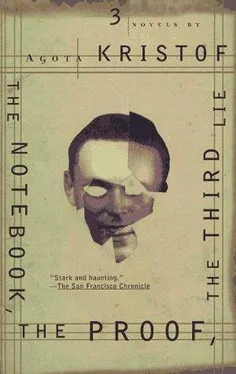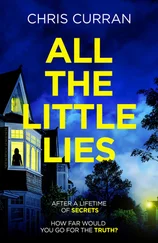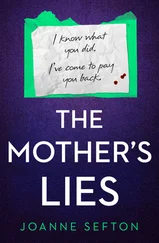We often go into that room, because everything is clean there and it's more peaceful than the kitchen. That's where we usually do our studying.
The officer has a gramophone and records. Lying on the bed, we listen to music. Once, to please the officer, we play his country's national anthem. But he gets angry and smashes the record with his fist.
Sometimes we sleep on the bed, which is very wide. One morning, the orderly finds us there; he isn't happy:
"You very foolish! You no more do silly thing like that. What happen one time if the officer come back at night?"
"What could happen? There's enough room for him too."
The orderly says:
"You very stupid. One time you pay for stupidity. If the officer hurt you, I kill him."
"He won't hurt us. Don't worry about us."
One night, the officer comes home and finds us asleep on his bed. The light from the oil lamp wakes us. We ask:
"Do you want us to go to the kitchen?"
The officer strokes our heads and says:
"Stay there. Do stay."
He undresses and lies.down between us. He puts his arms around us, he whispers in our ears:
"Sleep. I love you. Sleep in peace."
We go back to sleep. Later, near morning, we want to get up, but the officer holds us back:
"Don't move. Keep sleeping."
"We want to urinate. We have to go."
"Don't go. Do it here."
We ask:
"Where?"
He says:
"On me. Yes. Don't be afraid. Piss! On my face."
We do it, then we go out into the garden, because the bed is all wet. The sun is already rising; we start our morning chores.
Sometimes the officer comes back with a friend, another, younger officer. They spend the evening together, and the friend stays over. We have observed them several times through the hole in the ceiling.
It's a summer's evening. The orderly is making something on the camp stove. He puts a cloth on the table, and we arrange flowers on it. The officer and his friend are sitting at the table; they are drinking. Later, they eat. The orderly eats near the door, sitting on a stool. Then they drink again. Meanwhile, we take care of the music. We change the records and wind up the gramophone.
The officer's friend says:
"These kids annoy me. Send them out."
The officer asks:
"Jealous?"
The friend answers:
"Of them? Don't be absurd! Two little savages."
"They're handsome, don't you think?"
"Perhaps. I haven't looked at them."
"Really, you haven't looked at them. Then look at them."
The friend blushes:
"What do you mean? They annoy me with their sneaky ways. As if they were listening to us, spying on us."
"But they are listening to us. They speak our language perfectly. They understand everything."
The friend goes pale and gets up:
"This is too much! I'm leaving!"
The officer says:
"Don't be a fool. Off you go, kids."
We leave the room and go up to the attic. We look and listen.
The officer's friend says:
"You made me look ridiculous in front of those stupid kids."
The officer says:
"Those are the two most intelligent children I have ever met."
The friend says:
"You're just saying that to hurt me, to make me suffer. You'll do anything to torment and humiliate me. One day I'll kill you!"
The officer throws his revolver on the table:
"If only you would! Take it. Kill me! Go on!"
The friend picks up the revolver and points it at the officer:
"I will. You'll see, I will. The next time you mention him, the other one, I'll kill you."
The officer closes his eyes, smiles:
"He was handsome… young… strong… graceful… delicate… cultivated… tender… dreamy… brave… arrogant… I loved him. He died on the Eastern front. He was nineteen. I can't live without him."
The friend throws the revolver on the table and says:
"Swine!"
The officer opens his eyes, looks at his friend:
"What lack of courage! What lack of character!"
The friend says:
"Then do it yourself if you have so much courage, and so much grief. If you can't live without him, follow him into death. Or do you need me to help you? I'm not crazy! Die! Die alone!"
The officer picks up the revolver and puts it to his temple. We come down from the attic. The orderly is sitting in front of the open door of the room. We ask him:
"Do you think he's going to kill himself?"
The orderly laughs:
"You not fear. They always do that when drink too much. I unload two revolvers before."
We go into the room and say to the officer:
"We'll kill you if you really want us to. Give us your revolver."
The friend says:
"Little bastards!"
The officer smiles and says:
"Thank you. That's very kind of you, but we were only playing. Go to bed now."
He gets up to shut the door behind us and sees the orderly:
"Are you still there?"
The orderly says:
"I haven't been given permission to go."
"Be off with you! I want to be left in peace! Understand?" Through the door we can still hear him saying to his friend: "What a lesson for you, you weakling!" We also hear the noise of a fight, blows, the crash of chairs being knocked over, a fall, shouts, panting. Then there is silence.
The housekeeper often sings. Old popular songs and the latest songs about the war. We listen to these songs and practice them on our harmonica. We also ask the orderly to teach us songs of his country.
Late one evening, when Grandmother is already in bed, we go into town. Near the castle, in an old street, we stop in front of a low house. Noise, voices, and smoke are coming from the door, which opens on a staircase. We go down the stone steps and find ourselves in a cellar converted into a café. Men are standing or sitting on wooden benches and barrels, drinking wine. Most of them are old, but there are also a few young ones and three women. No one takes any notice of us.
One of us starts to play the harmonica, and the other sings a well-known song about a woman waiting for her husband, who has gone to war and will come home soon, victorious.
Gradually everybody turns toward us; the voices die down. We sing and play louder and louder, we hear our melody resound and echo from the vaulted ceiling of the cellar, as if it were someone else playing and singing.
Our song finished, we look up at the tired, hollow faces. A woman laughs and applauds. A young one-armed man says in a husky voice:
"More. Play something else!"
We change roles. The one who had the harmonica hands it to the other, and we begin a new song.
A very thin man staggers up to us and shouts in our faces:
"Silence, dogs!"
He pushes us roughly aside, one to the right, one to the left; we lose our balance; the harmonica falls. The man goes up the stairs holding on to the wall. We can still hear him shouting in the street:
"Why can't they all shut up!"
We pick the harmonica up and clean it off. Someone says:
"He's deaf."
Someone else says:
"He's not only deaf. He's completely mad."
An old man strokes our hair. Tears are flowing from his sunken, black-ringed eyes.
"What misery! What a miserable world! Poor kids! Poor world!"
A woman says:
"Deaf or mad, at least he came back. You too, you came back."
She sits on the one-armed man's lap. The man says:
"You're right, my beauty, I came back. But what am I going to work with? How am I going to hold a board I want to saw? With my empty coat sleeve?"
Another young man, sitting on a bench, laughs and says:
"I too came back. But I'm paralyzed from the waist down. The legs and all the rest. I'll never get it up again. I'd rather have gone quickly, in one fell swoop, and stayed there."
Читать дальше






![Джеффри Дивер - Where the Evidence Lies [A Lincoln Rhyme Short Story]](/books/403782/dzheffri-diver-where-the-evidence-lies-a-lincoln-r-thumb.webp)





